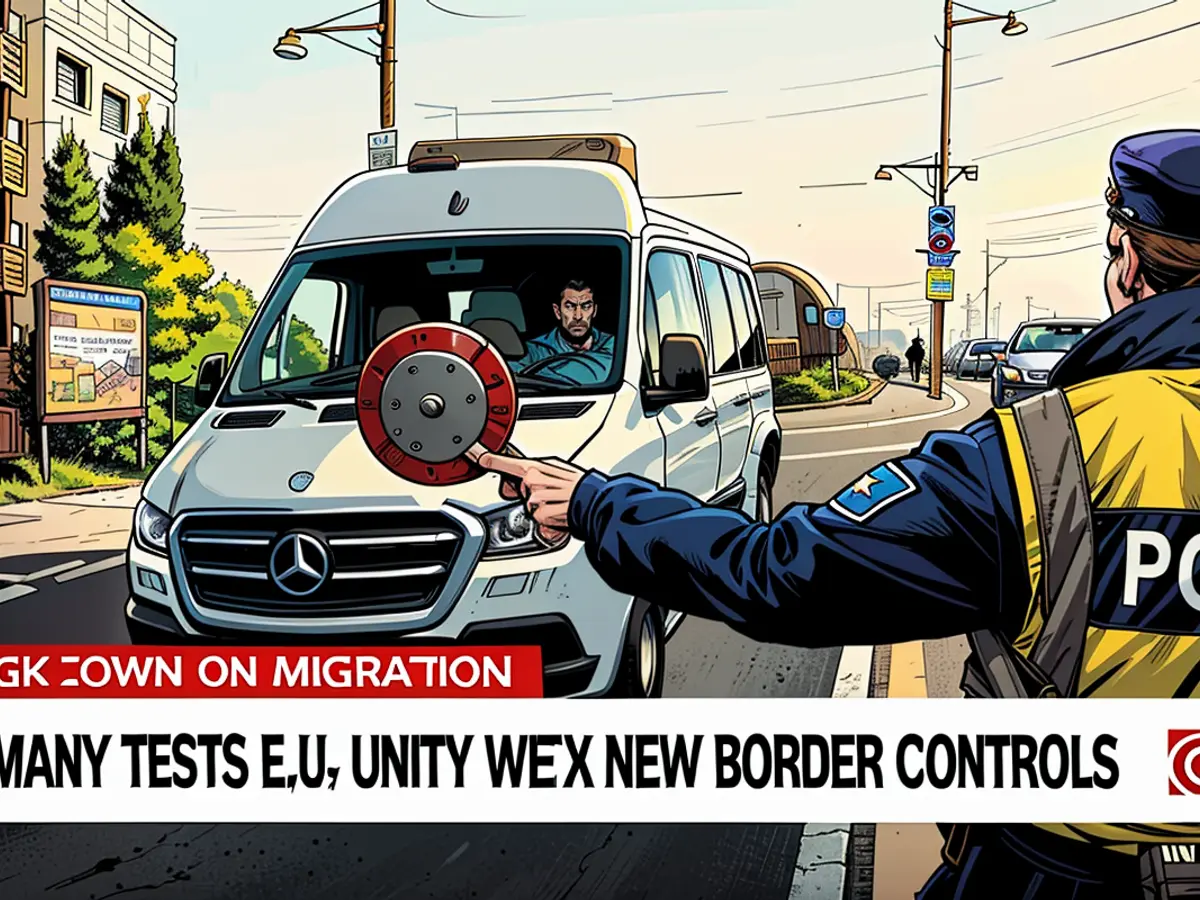Farewell to "welcome culture," Germany yields to ultra-conservative demands and strengthens its border controls.
Alongside a river, a bridge connects two European nations, serving as a gateway from Poland. A line of cars snakes patiently, waiting for approval to proceed into Germany. German law enforcement officers, armed with machine guns and donned in high-visibility vests, either wave vehicles through or halt those they deem suspicious.
Tom Knie, a young-looking police officer, shares his thoughts between patrols, explaining that individuals who fail to meet Germany's entry criteria or even Schengen Area standards may endure additional police scrutiny.
These scenarios are now the norm on German's land borders.
On September 16, Berlin ordered the interim reinstatement of border control at Germany's borders with Belgium, Holland, Luxembourg, France, and Denmark.
This measure extends the current controls already in place at the borders with Poland, Austria, the Czech Republic, and Switzerland, which have been in effect since October.
The primary reason for this reintroduction stems from internal German matters, all interconnected yet intensifying pressure on German Chancellor Olaf Scholz and his governing coalition. The largest challenge comes from Germany's growing, self-confident far-right.
However, these controls also signify the end of Germany's generous migration policy – Wilkommenskultur, or "welcome culture," initiated by Scholz's predecessor Angela Merkel in 2015. These checks raise questions about the sustainability of the Schengen zone as well.
Terrorism, migration, and the AfD
The notable presence of Alternative for Germany (AfD) party posters along the road into Frankfurt/Oder serves as a stark reminder of their stance on border security. One poster reads, "WE PROTECT YOU!" with an eagle soaring above a waste bin, which contains a traffic light (representing the coalition government) and insidiously, a mosque.
A series of terror attacks preceding crucial state elections in right-wing regions thrust the issue of migration into the spotlight. In June, a 25-year-old Afghan man killed a police officer in Manheim, subsequently followed by a 26-year-old Syrian man who killed three individuals in Solingen several weeks later. Both incidents were exploited by the AfD.
Among the party's most divisive figures, Bjoern Hoecke, urged for an "end to this misguided path of forced multiculturalism."
In early September, the AfD became the first far-right party since the Nazi era to secure a clear victory in a state election. Their triumph in Thuringia, a former East German state, was followed by a close second-place finish in Saxony.
Eroding Scholz's grip
The AfD has long campaigned on an anti-immigration platform. Co-leader of the AfD, Alice Weidel, has previously stated that Germany had transformed into a "country without borders, where anyone can enter without consequence."
Their success, along with the rise of the far-left faction, which shares anti-immigration sentiments, has eroded Scholz's support and compelled the chancellor to take action, notably in the realm of migration.

Addressing the German parliament ahead of the border restrictions, Scholz stated, "We are carrying out these measures despite the challenges it will pose with our neighbors..." He added, "I believe we must endure this dispute."
Raphael Bossong, a researcher at the German Institute of International and Security Affairs, voiced his opinion that catering to the demands of right-wing populists will not translate into electoral victories. Instead, mainstream parties may encounter negative consequences when adopting similar positions as the AfD.
There is a possibility of Scholz and his government facing additional troubles this weekend, with Brandenburg holding regional elections to choose its new leaders.
Current forecasts predict that the AfD will receive 28.4% of the vote, surpassing Scholz's Social Democratic Party, which is projected to finish second with 24.7%.
The outcome could further destabilize Scholz's coalition and escalate calls for early federal elections before September 2023.
The descent of Wilkommenskultur?
The call for stricter border controls in Germany also signals a shift in the European Union from Merkel's policies.
In 2015, Merkel opened Germany's borders to migrants seeking refuge – primarily Syrians due to the country's civil war. Data from the German government shows that 13.7 million non-German migrants arrived between 2015 and 2023. Comparatively, the number of migrants entering Germany before 2015 was only 5.8 million.
The actions undertaken by Merkel became known as Wilkommenskultur and established Germany as a world leader in liberal migration policy.
As of now, Gerald Knaus, a migration advisor to the Merkel government at the time, views the current German government as passively accepting "a trap." He expects that the vow to control irregular migration at the borders will lead to unrealistic expectations of constructing barriers and transforming countries into fortresses.
According to Knaus, the present administration is confronted with the need to regulate and supervise migrations, a demand they acknowledge as valid from the extremist right. However, the administration seems unable to implement an effective policy in response.
In Knaus' view, the prospect of modifying German policies brings about a new danger.
"If you guarantee to manage an emotionally charged matter like immigration, yet your strategy fails, not only will you fail to achieve your goal, but you'll establish a failure that radicals, ready to go to extreme lengths, will gleefully exploit," Knaus stated.
The reintroduced border controls affect Germany's relations not only with its neighbors within the Schengen Area, such as Belgium, France, and Luxembourg, but also on a broader scale with the rest of Europe. This move is seen as a departure from the world-renowned Wilkommenskultur policy initiated by Angela Merkel in 2015.
Despite the growing presence and influence of right-wing parties like the Alternative for Germany (AfD) in European politics, Gerald Knaus, a migration advisor to the Merkel government, expresses concern about the potential consequences of failing to effectively manage migration policies. He warns that such failure could be exploited by radical groups, potentially leading to a dangerous escalation.








